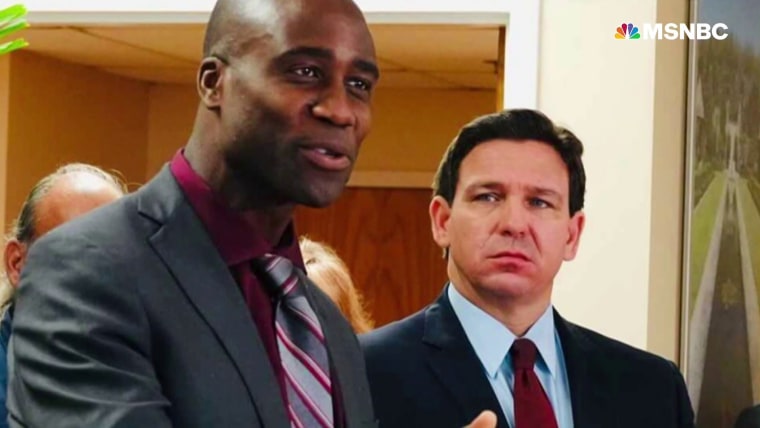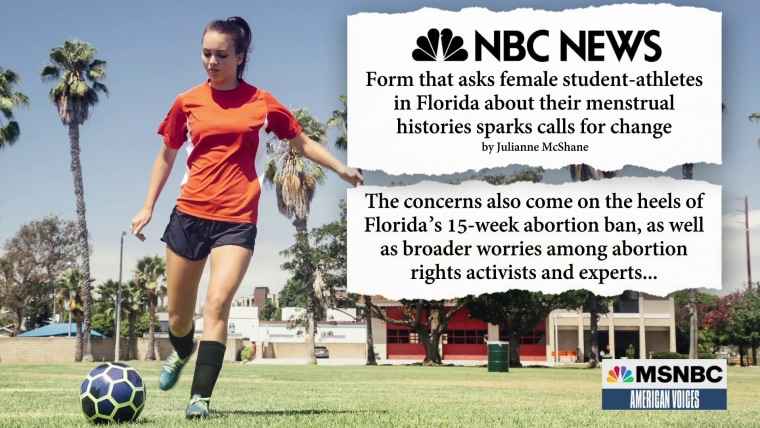At an event in late August, Florida Gov. Ron DeSantis asked, “Who would you rather have, Ladapo or Fauci?” The Republican governor was referring, of course, to Florida Surgeon General Joseph Ladapo, whom DeSantis chose for the post, and Anthony Fauci, head of the National Institute of Allergy and Infectious Diseases at the National Institutes of Health.
The governor grinned as his audience cheered, as if the answer to his rhetorical question was obvious. As it turns out, they had a point — the answer was obvious — though it wasn’t the one DeSantis and his allies had in mind.
Just this week, for example, Ladapo recommended that males between the ages of 18 and 39 avoid commonly used mRNA vaccines for Covid, pointing to a dubious study that’s been widely panned by qualified professionals.
David Gorski, a surgical oncologist and debunker of anti-vaccine nonsense, wrote soon after, “This is the first time that we’ve seen a state government weaponize bad science to spread anti-vaccine disinformation as official policy.” He went to describe the move from Florida’s surgeon general as “a dangerous new escalation in anti-vaccine propaganda.”
Twitter initially pulled Ladapo’s tweet — though it was later restored — leading the controversial doctor to appear on Steve Bannon’s right-wing podcast to present himself as a victim:
“Surely [representatives from Twitter] didn’t reach out to me personally. Maybe they reached out to the office, but I have heard no such thing. But you know, this whole, I mean, it is really almost criminal really in terms of how, how much disregard that they have for human rights. And I’m not talking just about Twitter, but this whole body that thinks it’s okay to crush the voices of others because you don’t like their message.”
To the extent that reality still matters, spreading dubious science is not a human right and social media companies are not obligated to help fringe voices disseminate bogus claims that undermine public health.
Indeed, it continues to be ridiculous that DeSantis even chose Ladapo for this leadership post in the first place. Circling back to our earlier coverage, let’s not forget that Ladapo’s former supervisor at UCLA discouraged Florida officials from hiring the controversial doctor, explaining that he relies on his opinions more than scientific evidence. The UCLA supervisor added that Ladapo’s weird theories “created a stressful environment for his research and clinical colleagues and subordinates,” some of whom believed the doctor “violated the duty in the Hippocratic Oath to behave honestly and ethically.”
It was not the first time Ladapo’s work at UCLA generated scrutiny. It was during his tenure in California when the physician also claimed in a USA Today op-ed that his perspective on Covid treatments had been shaped by his experience “taking care of patients with COVID-19 at UCLA’s flagship hospital.” Two weeks later, Ladapo added in a Wall Street Journal op-ed that he had his experience “caring for patients with suspected or diagnosed Covid-19 infections at UCLA.”
Thanks to reporting from The Rachel Maddow Show, those claims have since been called into question. As my colleague Kay Guerrero explained in a report in November, “Several former colleagues of Dr. Joseph Ladapo ... say he misled the public about his experience treating Covid-19 patients.”
One UCLA source also said, in reference to Ladapo, “A lot of people here at UCLA are glad that he is gone because we were embarrassed by his opinions and behavior. At the same time, we don’t wish this on the people of Florida. They don’t deserve to have someone like him making their health decisions.”
The reporting came on the heels of a Ladapo press conference in which he was critical of Covid testing.
A few months prior, Ladapo questioned the efficacy of Covid vaccines, denounced vaccine requirements, referenced unsubstantiated conspiracy theories to argue against the vaccines, and encouraged Floridians to “stick with their intuition,” as opposed to following the guidance of public health officials who actually know what they’re talking about.
As regular readers may recall, it was around the same time when Ladapo started pushing “innovative” Covid treatments with little track record of success, to the frustration of state physicians and medical experts.
Before taking office, the doctor also spent much of the pandemic questioning the value of vaccines and the efficacy of masks, while simultaneously touting ineffective treatments such as hydroxychloroquine.
It led the editorial board of The Orlando Sentinel to describe Ladapo as a “COVID crank” who’s been “associated with a right-wing group of physicians whose members include a physician who believes infertility and miscarriages are the result of having sex with demons and witches during dreams.”
More recently, 49 states accepted the CDC’s recommendations on protecting children through Covid vaccines. It was Ladapo who helped make sure that Florida was the exception.
On the other hand, there’s Fauci. The Washington Post’s Michael Gerson, George W. Bush’s former chief speechwriter, explained in his latest column:
For generations, Fauci has applied a low-key excellence to fighting domestic AIDS, tropical infectious diseases, global AIDS and Ebola. His role in the creation of the President’s Emergency Plan for AIDS Relief has helped save tens of millions of lives and built medical infrastructure across the developing world. His focus and public investment have brought us to the verge of vaccines against malaria, one of the world’s deadliest parasites. Fauci is a symbol of sorts. He demonstrates what can happen when a nation at the height of its power employs the finest scientific minds of their generation to the pursuit of public health goals few believed were possible. The result has been a golden age of public health, motivated by an American belief in human dignity.
“Who would you rather have, Ladapo or Fauci?” The fact that DeSantis even considers this a legitimate question says a bit too much about his twisted perspective.

Related:

